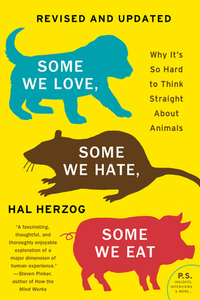You need to sign in or sign up before continuing.
Take a photo of a barcode or cover
172 reviews for:
Some We Love, Some We Hate, Some We Eat: Why It's So Hard to Think Straight About Animals
Hal Herzog
172 reviews for:
Some We Love, Some We Hate, Some We Eat: Why It's So Hard to Think Straight About Animals
Hal Herzog
emotional
informative
reflective
slow-paced
So this was a weird one for me. I initially looked into getting this book because I thought it was a vegan book (it's not). I decided to read it anyways and it had some good, bad, gross, and somewhat annoying parts.
I can't say it was bad just because I disagree with a lot of it. Facts are facts, and opinion are opinions!
I can't say it was bad just because I disagree with a lot of it. Facts are facts, and opinion are opinions!
Such an interesting read, with different moral questions broken down into anecdotes that made it super engaging. At times, the author not making a judgement/ endlessly sitting on the fence started to feel like a bit of cop out, but would definitely recommend!
I read this for my English class and I loved it! It is a perfect combination of personal stories and educational facts. He has a great writing style and is very good at being neutral and presenting both sides. It is a book that makes you think beyond the words.
It's a well organized book, despite how many facets of animal welfare it tries to cover. It's a really great starter book to the field of Anthrozoology. An easy read, even if the content can be hard to swallow.
Interesting discussions across a broad line of questions regarding our interactions with animals.
I thoroughly enjoyed this nonjudgmental and engaging examination of the complexity of human-animal interactions. Herzog raises many thought-provoking contradictions and irrationalities!
The book by Hal Herzog is a joy to read but the more reviews I read on Goodreads, the more I realised how many flaws it still has (which my background knowledge is still weak to defend).
The good point of this book is how readable it is for common readers and each research/ scientific experiment was chosen and laid out carefully. It's challenging thoughts by evoking lots of questions related to human-animal relationships and despite the fact that some readers might not agree with how he concludes each chapter, I - on the other hand - find it interesting and easy to comprehend rather than feeling upset for being left in confusion about which side he is on.
___
PERSONAL NOTES:
* 'The bottom line is that there are many reasons why human-animal interactions are so often inconsistent and paradoxical. Thousands of studies have demonstrated that human thinking about nearly everything is surprisingly irrational. And the waters get particularly muddy when we think about other species. Instincts seduce us into falling in love with big-eyed creatures with soft features. Genes and experience conspire to make it easy for us to learn to fear some animals but not others. Our culture tells us which species we should love, hate, and eat. Then there are the conflicts between reason and emotion, our reliance on hunches and empathy, and our propensity to project our own thoughts and desires into the heads of others.
No wonder our relationships with other species are so messy.' / p.65
* 'vivisection - the nineteenth-century term for invasive animal research' / p.207
* 'Philosophers have a phrase for what happens when people take logic to bizarre extremes. They say you are "caught in the grip of a theory."' / p.255
* 'You can't save all the animals in the world, but the ones that come into your care, you are responsible for. So, once the fly enters my house, I have a responsibility to treat it with kindness' //Words by Michael Moutain, Best Friends Animal Society// / p.266
* 'When I first started studying human-animal interactions I was troubled by the flagrant moral incoherence I have described in these pages - vegetarians who sheepishly admitted to me they ate meat; cockfighters who proclaimed their love for their roosters; purebred dog enthusiasts whose desire to improve their breed has created generations of genetically defective animals; hoarders who caused untold suffering to the creatures living in filth they claim to have rescued. I have come to believe that these sorts of contradictions are not anomalies or hypocrisies. Rather, they are inevitable. And they show we are human.' / p.279
The good point of this book is how readable it is for common readers and each research/ scientific experiment was chosen and laid out carefully. It's challenging thoughts by evoking lots of questions related to human-animal relationships and despite the fact that some readers might not agree with how he concludes each chapter, I - on the other hand - find it interesting and easy to comprehend rather than feeling upset for being left in confusion about which side he is on.
___
PERSONAL NOTES:
* 'The bottom line is that there are many reasons why human-animal interactions are so often inconsistent and paradoxical. Thousands of studies have demonstrated that human thinking about nearly everything is surprisingly irrational. And the waters get particularly muddy when we think about other species. Instincts seduce us into falling in love with big-eyed creatures with soft features. Genes and experience conspire to make it easy for us to learn to fear some animals but not others. Our culture tells us which species we should love, hate, and eat. Then there are the conflicts between reason and emotion, our reliance on hunches and empathy, and our propensity to project our own thoughts and desires into the heads of others.
No wonder our relationships with other species are so messy.' / p.65
* 'vivisection - the nineteenth-century term for invasive animal research' / p.207
* 'Philosophers have a phrase for what happens when people take logic to bizarre extremes. They say you are "caught in the grip of a theory."' / p.255
* 'You can't save all the animals in the world, but the ones that come into your care, you are responsible for. So, once the fly enters my house, I have a responsibility to treat it with kindness' //Words by Michael Moutain, Best Friends Animal Society// / p.266
* 'When I first started studying human-animal interactions I was troubled by the flagrant moral incoherence I have described in these pages - vegetarians who sheepishly admitted to me they ate meat; cockfighters who proclaimed their love for their roosters; purebred dog enthusiasts whose desire to improve their breed has created generations of genetically defective animals; hoarders who caused untold suffering to the creatures living in filth they claim to have rescued. I have come to believe that these sorts of contradictions are not anomalies or hypocrisies. Rather, they are inevitable. And they show we are human.' / p.279
informative
medium-paced
The chapters on cockfighting and research mice were excellent, both in their detailed and personal lens and in the ethical/philosophical arguments they make, and obviously where the author spent the most time and research. But other chapters were either half-baked in the reporting effort or just based on stereotypes and the author's own prejudices. Especially two sections: the one on gender differences in caring about animals, in which the author succumbs to "Bell Curve" thinking rather than making an actual point; and the one where he talks about Asian attitudes toward dog meat. The author is totally fine with graphic descriptions of animal butchery and death in Western culture, but he plays coy with the descriptions of animal butchery in Korean culture, seemingly out of a desire to titillate and shock. "You can also buy packs of 'digested dogmeat.' (I am not sure what this is.) A medicinal tonic... is also produced from dogs. You don't want to know how it is made." Gasp! I just couldn't bear to learn about those poor puppies, even though we heard in detail about the grotesque fates of neurological lab mice and broiler chickens in previous chapters. The author seems to be succumbing to the very biases he's trying to explore.
Graphic: Animal cruelty
Moderate: Racism, Sexism
I actually quit reading this beacuse, though very small parts were interesting, overall I was bored. I suppose because it read more like a textbook and I never was a huge fan of reading for school. :D





